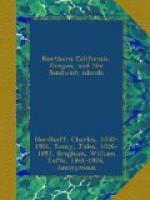In Australia and New Zealand sheep inspectors are appointed, who have the duty to examine flocks and force the isolation of scabby sheep; and a careless flock-master who should be discovered driving scabby sheep through the country would be heavily fined; here the law says nothing on this head, but I have found this spring several sheep owners in the Sacramento Valley who assured me that they had eradicated scab so entirely from their flocks that they dealt also by isolation with such few single specimens as they found to have this disease.
Moreover, I find that the best sheep farmers aim to keep, not the largest flocks, but the best sheep. There is no doubt that the sheep deteriorates in this State unless it is carefully and constantly bred up. “We must bring in the finest bucks from Australia, or the East, or our own State,” said one very successful sheep farmer to me; “and we must do this all the time, else our flocks will go back.” “It is more profitable to keep fewer sheep of the best kind than more not quite so good. It is more profitable to keep a few sheep always in good condition than many with a period of semi-starvation for them in the fall,” said another; and added, “I would rather, if I were to begin over again, spend my money on a breed worth six dollars a head, than one worth two or three dollars, and I would rather not keep sheep at all than not fence.” He had his land—about twenty-five thousand acres—fenced off in lots of from four to six thousand acres, and into one of these he turned from six to eight thousand sheep, leaving them to graze as they pleased. He had noticed, he told me, that whereas the sheep under the usual corral system feed the greater part of the day, no matter how hot the sun, his sheep in these large pastures were lying down from nine in the morning to four or five in the afternoon; and he often found them feeding far into the night, and rising again to graze long before daylight. They were at liberty to follow their own pleasure, having water always at hand. An abundant supply of water he thought of great importance.
[Illustration: INDIAN SWEAT-HOUSE.]
Of course, where the sheep are turned out into fenced land no shepherds are required, which makes an important saving. One man, with a horse, visits the different flocks, and can look after ten or fifteen thousand head.
The farmer whom I have quoted does not dip his sheep to prevent or cure scab, but mops the sore place, when he discovers a scabby sheep, with a sponge dipped into the scab-mixture.
He gets, he told me, from his flock of ten thousand merinoes, an average of seven pounds per head of wool, and he does not shear any except the lambs, in the fall. It is a common but bad practice here to shear all sheep twice a year; and where, as is too often the case, a flock is very scabby, no doubt this is necessary.




